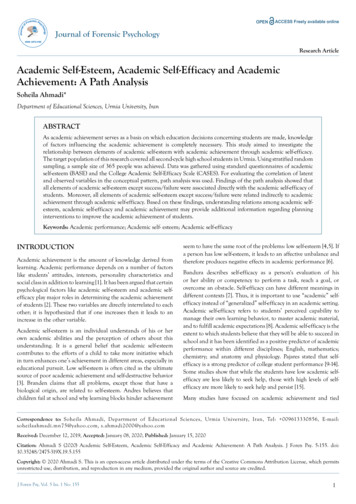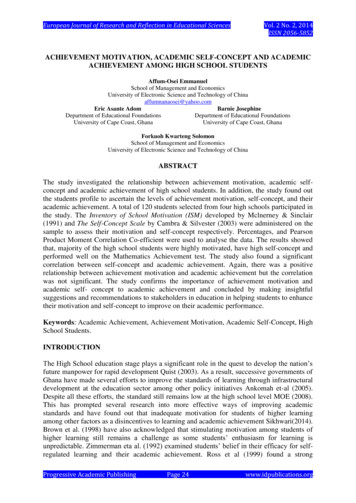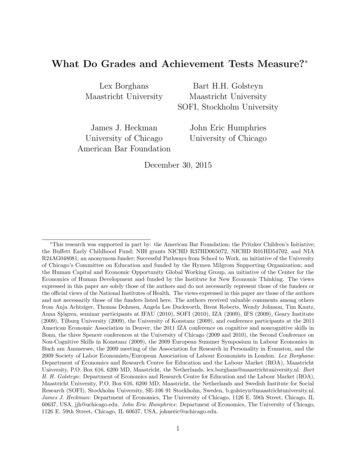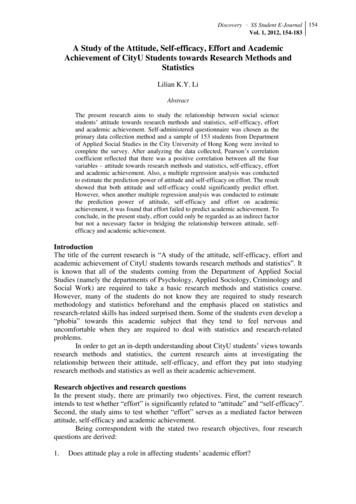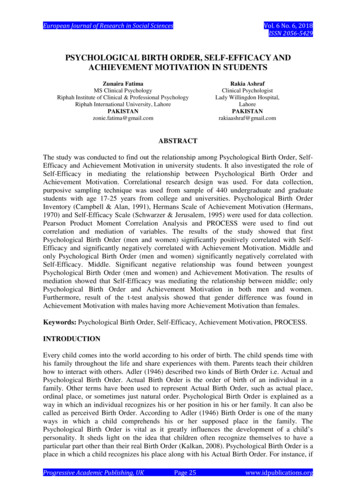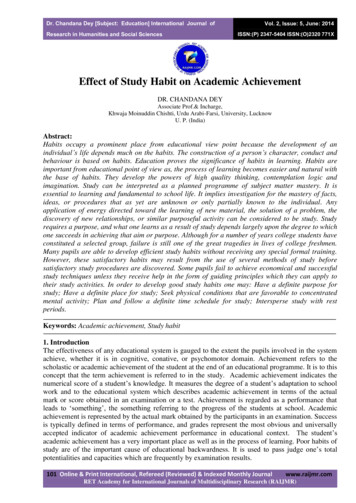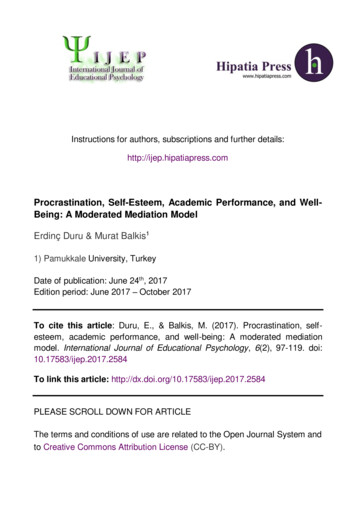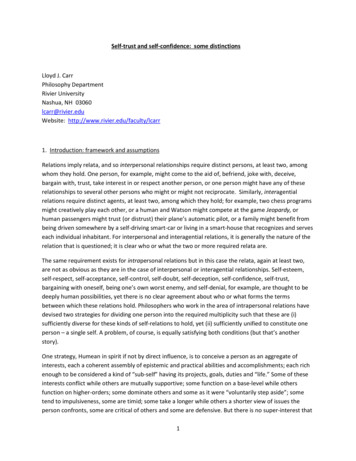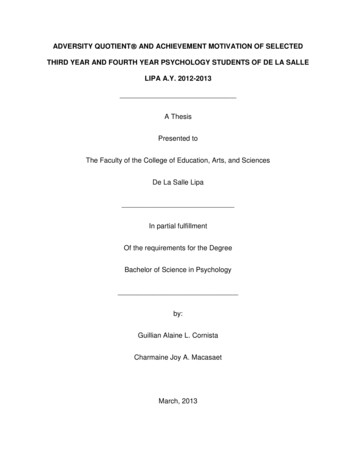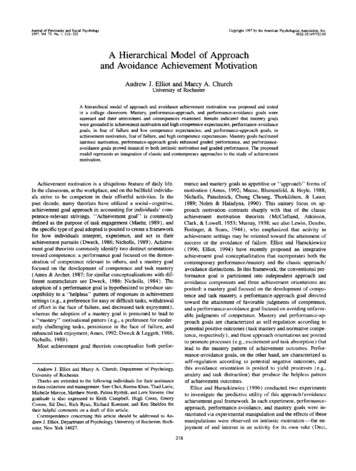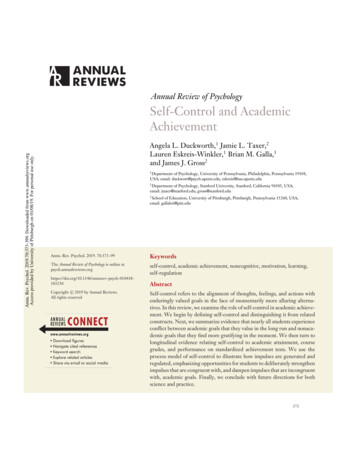
Transcription
PS70CH16 DuckworthARI20 November 20189:14Annual Review of PsychologyAnnu. Rev. Psychol. 2019.70:373-399. Downloaded from www.annualreviews.orgAccess provided by University of Pittsburgh on 01/08/19. For personal use only.Self-Control and AcademicAchievementAngela L. Duckworth,1 Jamie L. Taxer,2Lauren Eskreis-Winkler,1 Brian M. Galla,3and James J. Gross21Department of Psychology, University of Pennsylvania, Philadelphia, Pennsylvania 19104,USA; email: duckwort@psych.upenn.edu, eskreisl@sas.upenn.edu2Department of Psychology, Stanford University, Stanford, California 94305, USA;email: jtaxer@stanford.edu, gross@stanford.edu3School of Education, University of Pittsburgh, Pittsburgh, Pennsylvania 15260, USA;email: gallabri@pitt.eduAnnu. Rev. Psychol. 2019. 70:373–99KeywordsThe Annual Review of Psychology is online atpsych.annualreviews.orgself-control, academic achievement, noncognitive, motivation, nurev-psych-010418103230c 2019 by Annual Reviews.Copyright All rights reservedAbstractSelf-control refers to the alignment of thoughts, feelings, and actions withenduringly valued goals in the face of momentarily more alluring alternatives. In this review, we examine the role of self-control in academic achievement. We begin by defining self-control and distinguishing it from relatedconstructs. Next, we summarize evidence that nearly all students experienceconflict between academic goals that they value in the long run and nonacademic goals that they find more gratifying in the moment. We then turn tolongitudinal evidence relating self-control to academic attainment, coursegrades, and performance on standardized achievement tests. We use theprocess model of self-control to illustrate how impulses are generated andregulated, emphasizing opportunities for students to deliberately strengthenimpulses that are congruent with, and dampen impulses that are incongruentwith, academic goals. Finally, we conclude with future directions for bothscience and practice.373
PS70CH16 DuckworthARI20 November 20189:14Annu. Rev. Psychol. 2019.70:373-399. Downloaded from www.annualreviews.orgAccess provided by University of Pittsburgh on 01/08/19. For personal use only.ContentsSELF-CONTROL AND ACADEMIC ACHIEVEMENT . . . . . . . . . . . . . . . . . . . . . . . . .DEFINING SELF-CONTROL . . . . . . . . . . . . . . . . . . . . . . . . . . . . . . . . . . . . . . . . . . . . . . . . . . .WHY SELF-CONTROL IS NEEDED IN ACADEMIC CONTEXTS . . . . . . . . . . . .SELF-CONTROL PREDICTS ACADEMIC ACHIEVEMENT . . . . . . . . . . . . . . . . . . .Academic Attainment . . . . . . . . . . . . . . . . . . . . . . . . . . . . . . . . . . . . . . . . . . . . . . . . . . . . . . . . . . .Academic Course Grades . . . . . . . . . . . . . . . . . . . . . . . . . . . . . . . . . . . . . . . . . . . . . . . . . . . . . . .Standardized Achievement Tests . . . . . . . . . . . . . . . . . . . . . . . . . . . . . . . . . . . . . . . . . . . . . . . .UNDERSTANDING SELF-CONTROL: HOW IMPULSESARE GENERATED . . . . . . . . . . . . . . . . . . . . . . . . . . . . . . . . . . . . . . . . . . . . . . . . . . . . . . . . . . .UNDERSTANDING SELF-CONTROL: HOW IMPULSESARE REGULATED . . . . . . . . . . . . . . . . . . . . . . . . . . . . . . . . . . . . . . . . . . . . . . . . . . . . . . . . . . .Situational Strategies . . . . . . . . . . . . . . . . . . . . . . . . . . . . . . . . . . . . . . . . . . . . . . . . . . . . . . . . . . .Attentional Strategies . . . . . . . . . . . . . . . . . . . . . . . . . . . . . . . . . . . . . . . . . . . . . . . . . . . . . . . . . . .Appraisal Strategies . . . . . . . . . . . . . . . . . . . . . . . . . . . . . . . . . . . . . . . . . . . . . . . . . . . . . . . . . . . . .Response Strategies . . . . . . . . . . . . . . . . . . . . . . . . . . . . . . . . . . . . . . . . . . . . . . . . . . . . . . . . . . . . .Shortcut Strategies . . . . . . . . . . . . . . . . . . . . . . . . . . . . . . . . . . . . . . . . . . . . . . . . . . . . . . . . . . . . .FUTURE DIRECTIONS . . . . . . . . . . . . . . . . . . . . . . . . . . . . . . . . . . . . . . . . . . . . . . . . . . . . . . . . .CONCLUSION . . . . . . . . . . . . . . . . . . . . . . . . . . . . . . . . . . . . . . . . . . . . . . . . . . . . . . . . . . . . . . . . . ELF-CONTROL AND ACADEMIC ACHIEVEMENTSelf-control: thealignment of thoughts,feelings, and actionswith enduringly valuedgoals in the face ofmomentarily morealluring litional, and learningprocesses thatcollectively contributeto students becomingindependent learnersImpulse: a responsetendency that is eitherdesirable orundesirable and that isdischarged (as athought, emotion, oraction) when ofsufficient strength374Teachers have long held that self-control is necessary for academic achievement (Dewey 1938). Inrecent decades, our understanding of the mechanisms underlying self-control has advanced wellbeyond early descriptions of will (Webb 1915). What have we learned about self-control and academic achievement? To answer this question, we begin by defining self-control and distinguishingit from related constructs, including conscientiousness, self-regulated learning, and compliancewith authority. Next, we explain why self-control is particularly relevant to carrying out the diversetasks of what Corno & Mandinach (2004) call studenting. We then turn to evidence that moreself-controlled students thrive academically at every level of formal schooling, from kindergartenthrough university. Using the process model of self-control (Duckworth et al. 2014), we explainhow impulses of any kind are generated in a recursive cycle that includes four stages: situation,attention, appraisal, and response. We summarize empirical evidence suggesting that self-controlentails deploying strategic maneuvers either to strengthen impulses that are congruent with academic goals or to weaken competing impulses. Last, we suggest especially promising directionsfor future research and practice.DEFINING SELF-CONTROLWe define self-control as the self-initiated regulation of thoughts, feelings, and actions when enduringly valued goals conflict with momentarily more gratifying goals. To illustrate this, considerthe example shown in Figure 1a, in which a student faces a self-control conflict when choosing between studying for a math test and scrolling through new photos in their Instagram feed.Scrolling through Instagram is extremely fun in the moment but not valued in the long run. Incontrast, studying for the math test is not very fun in the moment but valued in the long run,Duckworth et al.
PS70CH16 DuckworthARI20 November 20189:14abBecomea doctorDo wellin mathSeekPleasureDo wellin mathAnnu. Rev. Psychol. 2019.70:373-399. Downloaded from www.annualreviews.orgAccess provided by University of Pittsburgh on 01/08/19. For personal use only.ConflictStudy mathCheck social mediaSeekPleasureConflictStudy mathCheck social mediaFigure 1(a) Studying math and checking social media are mutually exclusive responses. Studying is congruent withthe academic goal of doing well in math, whereas checking social media is congruent with the goal ofimmediate pleasure. (b) Doing well in math is related to the student’s goal of becoming a doctor, whereaspleasure is primarily an end in itself. Self-control thus takes the form of enacting the impulse to study mathwhile refraining from the impulse to check social media.particularly because, as indicated in Figure 1b, this student dreams of becoming a doctor someday. Because the student cannot do both at once, they exert self-control in Figure 1b when theychoose the academic goal–congruent (AGC) response rather than the academic goal–incongruent(AGI) response.Given its popularity as an object of study, it is not surprising that self-control research suffersfrom the so-called jingle jangle problem identified by Kelley (1927) as an impediment to scientificprogress. The jingle problem arises because the term self-control is defined differently acrossresearch traditions (Duckworth & Kern 2011). For example, self-control has been characterizedin the classical philosophical and psychological literatures as effortful suppression of impulses[Freud 1977 (1916–1917), Plato 1995 (370 BCE)], but it can also refer to more strategic tactics forobviating goal conflict (Duckworth et al. 2016a, Hofmann & Kotabe 2012). The jangle problemarises when different terms are used to refer to the same underlying construct. Terms that havebeen used more or less interchangeably with self-control include delay of gratification, effortfulcontrol, inhibitory control, and cognitive control. Terms for the absence of self-control includedelay discounting, impulsivity, and impulsiveness.Exacerbating this semantic confusion, several constructs overlap with self-control but arebroader in scope. Most relevant to this review, the term self-regulated learning encompassesall of the psychological processes that contribute to students becoming independent learners(Zimmerman 1990). Self-regulated learning thus embraces not only the volitional process of selfcontrol, but also motivational processes such as academic self-efficacy and learning strategies suchas asking for feedback from teachers. Likewise, outside of educational psychology, the term selfregulation is sometimes used synonymously with self-control but usually refers to a more expansiveset of goal-directed processes, including motivation (Carver & Scheier 1981, Davisson & Hoyle2017).www.annualreviews.org Self-Control and Academic AchievementAGC: academicgoal–congruentAGI: academicgoal–incongruent375
PS70CH16 DuckworthARIAnnu. Rev. Psychol. 2019.70:373-399. Downloaded from www.annualreviews.orgAccess provided by University of Pittsburgh on 01/08/19. For personal use only.Big FiveConscientiousness:a family of personalitytraits encompassingself-control, as well asorderliness,dependability, grit,and the tendency tocomply with normsExecutive function:cognitive capacitiesincluding inhibitorycontrol, workingmemory, and cognitiveflexibility20 November 20189:14In the personality literature, self-control is a facet of Big Five Conscientiousness—a broadfamily of personality traits that encompasses the facets of orderliness, dependability, grit, andthe tendency to comply with social norms (Caspi & Shiner 2006, Eisenberg et al. 2014, Moffittet al. 2011, Park et al. 2017). The link between self-control and Big Five Conscientiousness isparticularly salient in the context of schoolwork (Park et al. 2017), but it should be noted that,in the context of interpersonal relationships (e.g., allowing others to speak without interruption),self-control is also related to Big Five Agreeableness (Park et al. 2017, Tsukayama et al. 2013),and in the context of regulating sadness, anxiety, and other negative emotions, self-control is alsorelated to Big Five Neuroticism (Gross & John 2003).In the cognitive neuroscience literature, the term executive function is sometimes used interchangeably with self-control. The conceptual overlap between executive function and self-controlis plain: Core executive functions include top-down inhibitory control, working memory, and thecognitive flexibility to switch perspectives when demands require doing so (Blair 2016, Diamond2013, Zhou et al. 2012). Nevertheless, meta-analyses reveal surprisingly weak correlations between task measures of executive function and questionnaire measures of self-control (Duckworth& Kern 2011, Sharma et al. 2014). Thus, while the basic mental processes that compose executivefunction no doubt lay the foundation for self-controlled behavior, it seems that doing what weknow is in our long-term best interests despite momentary temptations also depends on learnedstrategies and habits that are not well assessed by executive function tasks.Two features distinguish self-control from related concepts. First, self-control is necessarilyself-initiated. Thus, if a student puts away their cell phone to concentrate on math, they areexercising self-control. In contrast, if their teacher takes away the phone, then the student ismerely complying with authority (Eisenberg et al. 2014). Although the self in self-control isessential, this does not mean that exercising self-control is always conscious. As we discuss below,self-control can take the form of habits, rules, and plans that were consciously self-initiated in thepast but that, in the moment, take the form of automatic responses occasioned by situational cues.Second, self-control is only relevant to choices in which one option is recognizably morevaluable in the long run than the other but in which, nevertheless, the less valuable option ismomentarily more attractive. What does it mean for one option to be more valuable? It meansthat the more valued option is preferred to the less valued option upon reflection; consummatinga less valued option may be more gratifying in the moment but is soon regretted. This is becausegoals are organized hierarchically, with lower-level goals serving as means to higher-level goals(Kruglanski 1996). For example, in Figure 1, the goal of immediate pleasure serves no master,but the goal of doing well in school does. As Frankfurt (1988) has pointed out, the capacity to setaside what we merely want to do in the moment for what we more enduringly want to want to domakes it possible for us to engage in self-control.WHY SELF-CONTROL IS NEEDED IN ACADEMIC CONTEXTSIn Table 1, we provide verbatim vignettes from high school students asked to describe a recentexperience requiring self-control. Notably, the AGC responses could be from almost any century,while many of the AGI responses specify temptations unique to the modern era.Why do most students need to exercise self-control to succeed in academic contexts? Theanswer appears straightforward: It is because students recognize the value of academic work fortheir future, but in the moment in which they are completing it, they typically do not enjoy it. InFigure 2, experience sampling data from a nationally representative study of over 1,000 middleand high school students indicate that academic work (e.g., completing homework, taking a quiz) issubstantially less enjoyable than other daily activities, including socializing with friends or family,376Duckworth et al.
PS70CH16 DuckworthTable 1ARI20 November 20189:14Self-control dilemmas described by high school students in Duckworth et al.’s (2016b) studyAcademicAcademic goal–congruentresponseAnnu. Rev. Psychol. 2019.70:373-399. Downloaded from www.annualreviews.orgAccess provided by University of Pittsburgh on 01/08/19. For personal use only.Self-control dilemmagoal–incongruentresponse“I had a very important essay due the next day, however there was a hugefootball game on. I used my self-control to prevent myself from watchingthe game rather than doing my homework.”Working on an essayWatching television“A lot of times it can be difficult for me to concentrate on schoolwork. I wastrying to finish an essay before the end of class. It was hard for me to focusbecause some people had already finished and were talking loudly. I reallywanted to talk to them but I needed to finish to improve my grade.”Finishing an essay beforethe end of classTalking toclassmates“I wanted to finish an essay but I also wanted to watch Netflix and I was at agreat part in [a show called] The Office so The Office was more important atthat time, but I eventually did the essay.”Working on an essayWatching Netflix“I use self-control on a daily basis when doing my homework. A specificscenario that has happened more than once is when I am sitting at mydesk attempting to study and do homework and I can hear the televisionblasting my favorite show downstairs.”Doing homeworkWatching television“I once was working on a project with a group of people, and the others didno work on the project. Thus, leaving me to do all the work. I becamevery angry about this, however I did not lash out on the students I simplytold my teacher.”Working on a group projectwith classmates who arenot contributing theirshareLashing out at otherstudents“One day, I was not able to focus studying because I was Snapchatting andtexting constantly. I exercised self-control by turning off my iPhone so Icould focus on studying for my bio test.”StudyingSnapchatting andtexting“Once, my sixth grade teacher made it clear that we needed to pay attentionto get directions for a test. I told myself that I needed to pay attention.Even though she made the importance of paying attention very clear, Istill chose to daydream. When it was time to start the test, I had no ideawhat I was supposed to do.”Paying attention todirections for a testDaydreaming“A time when I used self-control was when I was in elementary school andother kids in my school thought it was cool if you skipped class. However,I did not skip class so I could look cool, instead I ignored what the kidsthought and stayed in class.”Attending classSkipping class tolook coolplaying sports or doing hobbies, watching television, and resting. Yet at the same time, studentsalso feel that academic work is more important for their long-term goals than any other activity.The pattern is similar regardless of whether the students are girls or boys, in middle or high school,living in wealthier or poorer neighborhoods, or higher versus lower achieving.These findings would not have surprised William James (1899, pp. 104–5), who asserted that,no matter how entertaining the instructor, in “schoolroom work,” there is inevitably “a large massof material that must be dull and unexciting.” More than a century later, students are still doinghomework and studying, organizing their belongings, completing classwork, taking tests, listeningto their teachers lecture, and participating in class discussions. Relative to other options, theseresponsibilities can feel tedious, and mastering new skills and knowledge is inherently difficult(Bjork & Bjork 2011), often precipitating frustration and confusion (D’Mello & Graesser 2012).More generally, the subjective experience of conflict between competing goals is reliably aversive(Inzlicht et al. 2015).www.annualreviews.org Self-Control and Academic Achievement377
PS70CH16 DuckworthARI20 November 20189:14Momentary subjective experience10090Academic work80All other activities706050403020100Immediate enjoymentFuture importanceAnnu. Rev. Psychol. 2019.70:373-399. Downloaded from www.annualreviews.orgAccess provided by University of Pittsburgh on 01/08/19. For personal use only.Figure 2Experience sampling data from a national sample of adolescents show that academic work (e.g., taking a testor quiz, doing homework) is experienced as less enjoyable than other daily activities (e.g., socializing withfriends or family, playing sports or doing hobbies, watching television, resting) but simultaneously moreimportant to future goals. Error bars are / 1 standard deviation of the mean. Data were taken from theSloan Study of Youth and Social Development (SSYSD; Schneider 2013). The Supplemental Materialsprovide details about the SSYSD and a full reporting of the results of this analysis.Although the academic duties of students are quite similar across generations, the digital distractions that now compete with them have evolved dramatically in recent years. In one study,undergraduates reported spending more than 7 h per day on their phones (Roberts et al. 2014).In another study, 92% of undergraduates admitted to sending or receiving a text message duringclass (Tindell & Bohlander 2012). Students aged 13 to 18 now spend more than 5.5 h per day usingentertainment media, including television, videogames, laptops, mobile phones, and tablets andexcluding reading time; students aged 8 to 12 average more than 3.5 h of entertainment media perday (Common Sense Media 2015). These estimates of recreational media use exclude time spent oncomputers while in the classroom or at home doing academic work on digital learning platforms.Often, when students are on screens, they are also multitasking with academic work. Whiledoing homework, for example, many teenagers simultaneously check their social network accounts(50%), watch television (51%), and send and receive text messages (60%) (Common Sense Media2015). Although the majority of teenagers believe that multitasking has no impact on their work(Common Sense Media 2015), in fact, multitasking typically slows learning (Bowman et al. 2010,Grace-Martin & Gay 2001, Kraushaar & Novak 2010, van der Schuur et al. 2015). Why, then, dostudents do it? Distractions provide an escape from academic work. For example, in a behavioraltask that allowed toggling between doing math problems and, alternatively, watching videos orplaying Tetris, boredom increased steadily for students who opted to do math but not for studentswho opted to entertain themselves (Galla et al. 2014a). Not surprisingly, more self-controlledstudents voluntarily spent more time on the former. In a naturalistic at-home investigation ofstudying, students aged 12 to 24 averaged fewer than 6 min on task before interrupting themselvesto get up, walk around, text, or check their social media accounts (Rosen et al. 2013).Since only 70% of US high school students pursue higher education (Kena et al. 2016,table 302.10), one might expect college students as a group to be better at resisting digital distractions. Unfortunately, undergraduates seem to struggle as much as, if not more than, youngerstudents. The majority of college students now use their laptop computers in the classroom(Carter et al. 2017, Patterson & Patterson 2017). Purportedly, a laptop facilitates notetaking andin-the-moment online research. However, taking notes on a laptop is generally less effective thantaking notes by hand (Mueller & Oppenheimer 2014), and the more frequently students use378Duckworth et al.
PS70CH16 DuckworthARI20 November 20189:14laptops in lecture, the less they are engaged and the lower are their grades (Fried 2008). Moreover, using a laptop creates distractions for other students: 64% of students in one study namedlaptop use by other students as a distraction, a percentage that is nearly three times higher thanthat of students’ own laptop use and twice as high as all other responses combined (Fried 2008).What is on a neighboring student’s screen is likely to be more than just their lecture notes: Eventhough they knew their in-class usage was being monitored, more than one-third of students’online activity in one recent study was spent checking email, messaging friends through socialmedia, reading the news, shopping, watching videos, and playing games (Ravizza et al. 2017).Annu. Rev. Psychol. 2019.70:373-399. Downloaded from www.annualreviews.orgAccess provided by University of Pittsburgh on 01/08/19. For personal use only.SELF-CONTROL PREDICTS ACADEMIC ACHIEVEMENTAcademic achievement is multiply determined: Study skills and learning strategies distinct fromself-control predict performance in school (Credé & Kuncel 2008, Hattie et al. 1996). Emotionalfactors like math anxiety (Foley et al. 2017) are also relevant, and accomplishing especially challenging goals over months and years requires grit (Eskreis-Winkler et al. 2016b). As mentionedabove, motivation is prerequisite; the absence of academic motivation renders self-control moot(Richardson et al. 2012, Robbins et al. 2004). Moreover, contextual factors including poverty,stress, and uncertainty dramatically shape academic trajectories in myriad ways, including viatheir influence on the development of self-control and affordances for its expression (Blair &Raver 2015, Duckworth et al. 2013b, Evans & Rosenbaum 2008, Kidd et al. 2013, Michaelson &Munakata 2016). Given the multitude of influences on academic achievement, it is notable thatkindergarten teachers single out aspects of self-control as most essential to success in school (Blair& Raver 2015, Heaviside & Farris 1993). Even more remarkable is the cumulative empirical evidence for the pervasive influence of self-control on academic attainment, academic course grades,and standardized achievement test scores (Duckworth & Carlson 2013).Academic AttainmentOne in four American students drops out of formal schooling before receiving a high schooldiploma (Heckman & LaFontaine 2007), and one in two college students drops out before graduating (Camara 2013). In prospective longitudinal studies, self-control predicts persisting withformal education (Moffitt et al. 2011) and successfully graduating from both high school (Kelly& Veldman 1964, Vitaro et al. 2005) and college (B.M. Galla, E.P. Shulman, B.D. Plummer,M. Gardner, S.J. Hutt, J.P. Goyer, A.S. Finn, S.K. D’Mello and A.L. Duckworth, manuscriptunder review). Compared to high school graduates of equivalent intelligence, students who dropout of high school and later pass the GED exam fare worse on a wide range of outcomes associatedwith lower self-control, including unemployment, criminal activity, dropout from the military,and drug abuse (Heckman et al. 2014).Academic Course GradesSelf-control predicts course grades at all levels of schooling, including early primary grades (Blair& Raver 2015, Normandeau & Guay 1998), later primary grades (Zhou et al. 2010), middleschool (Duckworth & Seligman 2005, Hofer et al. 2012), high school (B.M. Galla, E.P. Shulman,B.D. Plummer, M. Gardner, S.J. Hutt, J.P. Goyer, A.S. Finn, S.K. D’Mello and A.L. Duckworth,manuscript under review), and college (Tangney et al. 2004, Wolfe & Johnson 1995). Inferencesabout causality in nonexperimental investigations are necessarily limited, but in one 4-year longitudinal study, rank-order changes in self-control over time prospectively predicted changes inreport card grades, whereas neither changes in grades nor changes in self-reported self-esteemprospectively predicted changes in self-control (Duckworth et al. 2010).www.annualreviews.org Self-Control and Academic Achievement379
PS70CH16 DuckworthARI20 November 20189:14Annu. Rev. Psychol. 2019.70:373-399. Downloaded from www.annualreviews.orgAccess provided by University of Pittsburgh on 01/08/19. For personal use only.As noted above, Big Five Conscientiousness is the family of personality traits most related toself-control behaviors in the academic context (Park et al. 2017). In a meta-analysis of more than70,000 students from primary school through college, the association between grades and Big FiveConscientiousness (r 0.19) was larger than those between grades and Big Five Agreeableness,Openness to Experience, Extraversion, and Emotional Stability. Notably, this relationship wasalmost as large as that between grades and measured intelligence (r 0.23) (Poropat 2009).A more recent meta-analysis of psychological correlates of university grades corroborates thispattern: GPA in college is more strongly related to Big Five Conscientiousness (r 0.19) thanto any other Big Five personality family; the association between GPA and effort regulation inparticular is even stronger (r 0.32) (Richardson et al. 2012). Notably, observed effects arelargely independent of intelligence (Duckworth & Seligman 2005; Duckworth et al. 2010, 2013c;Poropat 2009).Standardized Achievement TestsSelf-control also predicts standardized achievement test scores, even when controlling for measured intelligence and family socioeconomic status (Alexander et al. 1993, Blair & Razza 2007,Duckworth & Seligman 2005, Galla et al. 2014b, Martin 1989, Valiente et al. 2010). Likewise, theamount of time that children can wait for a preferred treat in the preschool delay of gratificationtask predicts SAT scores (Mischel et al. 1989) and other standardized achievement test scores(Duckworth et al. 2013c). The same pattern holds for other tasks requiring inhibition of automaticresponses, sustained attention, and keeping instructions in working memory (McClelland et al.2007).Interestingly, self-control is more strongly related to course grades than to standardizedachievement test scores. For example, in two samples of middle school students, self-controlpredicted changes in report card grades over time better than intelligence did, an effect mediatedby homework completion and classroom conduct (Duckworth et al. 2012). Intelligence, on theother hand, predicted changes in standardized achievement test scores better than self-controldid. Among 8,454 high school seniors in the National Education Longitudinal Study, behaviorsknown to depend on self-control, including attending class regularly and promptly and completingwork on time, were more strongly associated with grades than with standardized achievement testscores (Willingham et al. 2002). Likewise, wait time in the preschool delay of gratification taskmore strongly predicts high school report card grades than standardized achievement test scores(Duckworth et al. 2013c).The disproportional influence of self-control on course grades explains why grades predictcollege persistence and graduation better than do standardized achievement test scores (Bowenet al. 2009, Geiser & Santelices 2007). Likewise, a developmental advantage in self-control helpsexplain why female students earn higher grades than their male counterparts in every subjectfrom primary school through college (Perkins et al. 2004, Voyer & Voyer 2014) despite minimaldifferences on standardized achievement tests, intelligence, or academic motivation (Duckworth& Seligman 2006, Duckworth et al. 2015).UNDERSTANDING SELF-CONTROL: HOW IMPULSESARE GENERATEDSince self-control dilemmas are common in the school context, and since more self-controlledstudents do better on academic outcomes than their more impulsive peers, what can be done tosupport the development of self-control? Answering this question begins with an understandingof how AGC and AGI impulses are generated.380Duc
PS70CH16_Duckworth ARI 20 November 2018 9:14 Annual Review of Psychology Self-Control and Academic Achievement Angela L. Duckworth,1 Jamie L. Taxer,2 Lauren Eskreis-Winkler,1 Brian M. Galla,3 and James J. Gross2 1Department of Psychology, University of Pennsylvania, Philadelphia, Pennsylvania 19104, USA; email: duckwort@psych.upenn.edu, eskreisl@sas.upenn.edu
